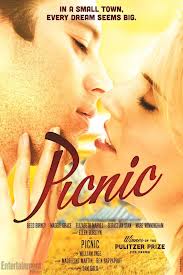Where is James Dean when you need him?
That’s what I was thinking as I watched the
workmanlike if uninspired production of William Inge’s 1953 Pulitzer
Prize-winning play, Picnic, now in previews at the American Airlines
Theater.
Inge’s domestic drama centers on a circle of
family and neighbors in a small town in Kansas, where predictable
lives are shaken up by the intrusion of an outsider, Hal. Hal is a combo pack of
earthy masculinity, wild unpredictability, and vulnerability that
raises the temperature for the repressed women, already sweltering in the late
summer’s heat.
Before Hal (Sebastian Stan) shows up looking
for work as a handyman, plans are underway for the annual Labor Day picnic, a
final fling before the start of the new school year.
We meet Flo Owens (Mare Winningham) and her
daughters, the younger Millie (Madeleine Martin),“the smart one,” and her older
sister Madge (Maggie Grace), 18, “the pretty one” whom Flo hopes to marry off
to Alan (Ben Rappaport), a pleasant enough well-to-do college student with
a bright future ahead of him. Madge and
Alan do seem to be a well suited, albeit “safe” match, until Hal comes along.
As a dramatic character, Hal is the kind of young
man who would have been portrayed in the movies by James Dean or Marlon Brando
(though, as it happens, it was William Holden—arguably too old for the part—who famously took on the role in the 1955 film version of the play).
Hal has been hired to do chores for the Owens’
neighbor Mrs. Potts (Ellen Burstyn). He reminds her of her own rebellious days, and his frequently-on-view shirtless hubba-hubba
torso clinches the deal.
As evening descends, it isn’t long before pretty
girl Madge and pretty boy Hal get together, and sparks begin to fly. Let’s just say, in appropriately 1950s
euphemistic terms, they never do make it to the picnic.
The story of Hal and Madge has its counterpart
with that of an older couple, Rosemary (Elizabeth Marvel), a spinster school
teacher who boards with the Owens family, and her beau Howard (Reed Birney), whom she
is determined to marry before she has to face one more day in the
classroom.
The production, efficiently directed by Sam Gold,
boasts solid performances by most of the cast.
Ms. Marvel and Ms. Burstyn are particularly compelling, despite the fact
that their characters are built on clichés.
Unfortunately, in the central role of Hal,
Sebastian Stan—best known for television and movie work (e. g. Captain America)—simply does not have the acting chops to pull this off. While his abs are
certainly ogle-worthy, Stan provides precious little of Hal’s wild streak, and the heat
between him and Ms. Grace wouldn't boil a pot of tea.
Theatergoers have an interesting opportunity to
compare Inge’s work with that of Clifford Odets, whose Golden Boy is currently
receiving a solid production a few blocks away at the Belasco. Where Odets
contextualizes his play in broader social themes, Inge narrows his focus to
life’s everyday dramas.
Feel free to tell your friends about this blog, and to share your own theater stories by posting a comment.

No comments:
Post a Comment